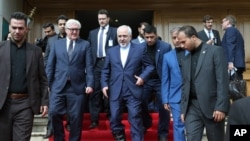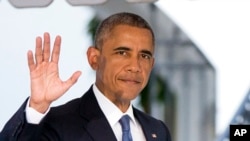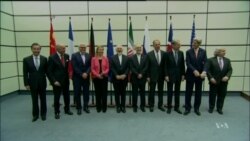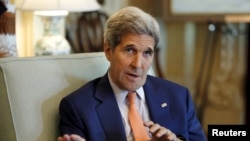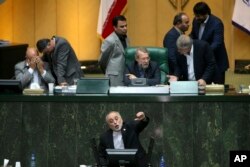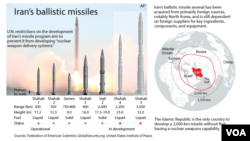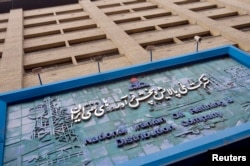President Barack Obama Sunday ordered the U.S. government to start preparing to lift sanctions against Iran on what was called Adoption Day -- the day all parties who signed the nuclear deal in July take the first steps towards implementing it.
"I welcome this important step forward, and we, together with our partners, must now focus on the critical work of fully implementing this comprehensive resolution that addresses our concerns over Iran's nuclear program," Obama said Sunday.
Obama said Iran has also started carrying out its side of the deal -- removing centrifuges, slashing its uranium stockpiles, and filling the Arak heavy-water nuclear reactor with concrete -- all to ensure it cannot build a nuclear weapon.
The European Union also passed legislation Sunday allowing its members to start looking at ending sanctions.
WATCH: Related video report by VOA's Pamela Dockins
But German Foreign Minister Frank-Walter Steinmeier predicted the sanctions will remain until Iran proves it is living up to its side of the bargain.
"That definitely won't be the case before the end of January. Now the question is whether Iran shows that it can fulfill its commitments," he said Sunday.
A newscast on Iranian state television Sunday said Tehran will act upon its commitments. Iranian officials suggested last week the country could meet its requirements by the end of the year.
U.S. Secretary of State John Kerry said a finalized deal could have ramifications for years to come.
"Iran will now begin taking all of the necessary steps outlined in the JCPOA to restrain its nuclear program and ensure that it is exclusively peaceful going forward," Kerry said in a statement Sunday.
Tough work ahead
Representatives from Iran and the six world powers who signed the deal - Britain, China, France, Germany, Russia, and the United States - meet in Vienna Monday to set up a commission that will oversee implementation.
Iran test-fired a medium-range missile earlier this month which U.S. officials say may be capable of carrying a nuclear weapon.
While the test does not violate the nuclear deal, it does violate a U.N. Security Council resolution.
But a senior U.S. official said he is reluctant to link the missile test to Iran's willingness to comply with the nuclear deal. The official called it another in a "long pattern" of Iran ignoring resolutions on ballistic missiles.
Potential windfall for Iran
Stratfor analyst Reva Bhalla said if Iran can meet the conditions that lead to sanctions relief, it could economically rehabilitate itself.
“In the immediate sense, it means between 40 and 50 million barrels of oil that Iran has in storage will be released on the market,” she said.
But as Iranian officials work to get their nuclear sites into compliance, they will need to sell the deal to the country’s hardliners, said Berman.
“They have to sell their constituency that the Islamic Republic has not changed its stripes, ideologically, despite the deal.”
He also said there is concern about whether Iran will remain in compliance once it begins reaping the benefits of sanctions relief.




